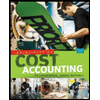please answer number 4,5 and 7
Master Budget
A master budget can be defined as an estimation of the revenue earned or expenses incurred over a specified period of time in the future and it is generally prepared on a periodic basis which can be either monthly, quarterly, half-yearly, or annually. It helps a business, an organization, or even an individual to manage the money effectively. A budget also helps in monitoring the performance of the people in the organization and helps in better decision-making.
Sales Budget and Selling
A budget is a financial plan designed by an undertaking for a definite period in future which acts as a major contributor towards enhancing the financial success of the business undertaking. The budget generally takes into account both current and future income and expenses.
Universal Electric Company is a small, rapidly growing wholesaler of consumer
electrical products. The firm’s main product lines are small kitchen appliances and
power tools. Marcia Wilcox, Universal’s general manager of marketing, has recently
completed a sales
of next year will increase by 10 per cent each month over the previous month’s sales.
Wilcox then expects sales to remain constant for several months. Universal’s projected
balance sheet as at 31 December this year is as follows:
Cash $ 35 000
Marketable securities 15 000
Inventory 154 000
Buildings and equipment (net of acc. depr.) 626 000
Total assets $1 100 000
Accounts payable $176 400
Long-term loan interest payable 12 500
Property taxes payable 3 600
Long-term loan payable (10% p.a.) 300 000
Share capital 500 000
Total liabilities and shareholders’ equity $1 100 000
Jack Hanson, the assistant accountant, is now preparing a monthly budget for the first
quarter of next year. In the process, the following information has been accumulated:
Projected sales for December this year are $400 000. Credit sales typically are 75
per cent of total sales. Universal’s credit experience indicates that 10 per cent of the
credit sales are collected during the month of sale, and the remainder are collected
during the following month.
Universal’s cost of goods sold generally runs at 70 per cent of sales. Inventory is
purchased on credit, and 40 per cent of each month’s purchases is paid during the
month of purchase. The remainder is paid during the following month. In order to
have adequate inventory on hand, the firm aims to have inventory at the end of each
month equal to half of the next month’s projected cost of goods sold. Hanson has
estimated that Universal’s other monthly expenses will be as follows:
Sales salaries $18 000
Advertising and promotion 19 000
Administrative salaries 21 000
Interest on long-term loan 2 500
Property taxes 900
In addition, sales commissions run at the rate of 1 per cent of sales.
Universal’s managing director, Beth Davies-Lowry, has indicated that the firm
should, just after the new year begins, invest $125 000 in an automated inventoryhandling system to control the movement of inventory in the firm’s warehouse. To
the extent possible, these equipment purchases would be financed from the firm’s
cash and marketable securities. Davies-Lowry believes that Universal needs to keep
a minimum cash balance of $25 000. If necessary, the remainder of the equipment
purchases would be financed using short-term credit from a local bank. The
minimum period for such a loan isthree months. Hanson believes short-term interest
rates will be 5 per cent per year at the time of the equipment purchases. If a loan is
necessary, Davies-Lowry has decided it should be paid off by the end of the first
quarter if possible.
Universal’s board of directors has indicated an intention to declare and pay
dividends of $50 000 on the last day of each quarter.
The interest on any short-term borrowing would be paid when the loan is repaid.
Interest on Universal’s long-term loan is paid semi-annually, on 31 January and 31
July, for the preceding six-month period.
Property taxes are paid half-yearly on 28 February and 31 August for the preceding
six-month period.
Required:
Prepare Universal’s annual budget for the first quarter of next year commencing
1 January by completing the following schedules and statements:
1. Sales budget
2. Cash receipts budget
3. Purchases budget
4. Cash payments budget
Cash payments budget
January February March 1st quarter
Inventory purchases
Cash payments for
purchases during the
current month*
Cash payments for
purchases during the
preceding month†
Total cash payments for
inventory purchases
Other expenses
Sales salaries
Advertising and promotion
Administrative salaries
Interest on long-term loan‡
Property taxes‡
Sales commissions
Total cash payments for
other expenses
Total cash payments
* 40% of the current month’s purchases (schedule 3).
† 60% of the preceding month’s purchases (schedule 3).
‡ Long-term loan interest is paid every six months, on 31 January and 31 July.
Property taxes are also paid every six months, on 28 February and 31 August.
5. Complete the first three lines of the summary
Summary cash budget
January February March 1st quarter
Cash receipts (from schedule 2)
Less Cash payments
(from schedule 4)
Change in cash balance during
quarter due to operations
Sale of marketable securities
(2 January)
Proceeds from bank loan
(2 January)
Purchase of equipment
Repayment of bank loan
(31 March)
Interest on bank loan
Payment of dividends
Change in cash balance
during 1st quarter
Cash balance, 1 January
Cash balance, 31 March
7. Prepare Universal’s
taxes.)
please answer number 4,5 and 7
Trending now
This is a popular solution!
Step by step
Solved in 4 steps with 2 images







